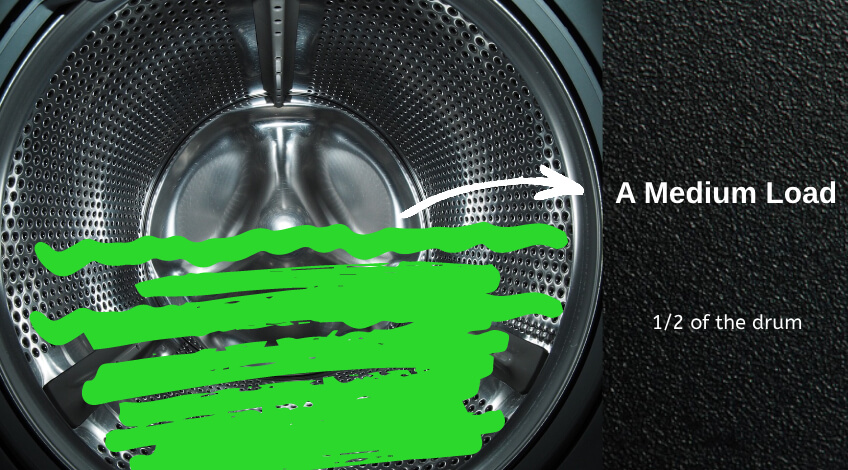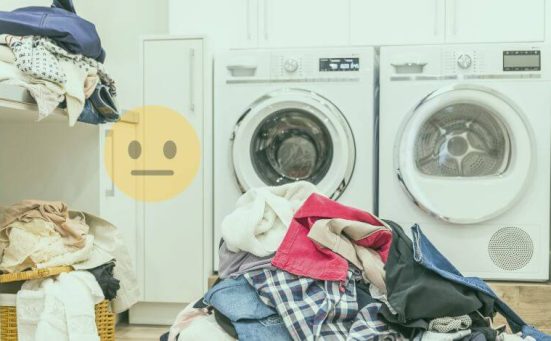
Does The Washing Machine’s “Capacity” Mean Dry Or Wet Laundry?
When it comes to doing laundry, understanding your washing machine’s capacity is key to efficient and effective cleaning. So, does the washing machine’s “capacity” refer to dry or wet laundry?
To keep it short: The capacity of a washing machine, whether it’s 5KG, 8KG, or 10KG, refers to the weight of dry laundry it can accommodate. Yes, you read that right – it’s the dry weight. However, for efficient cleaning, it’s recommended to load your machine with only 1/2 to 3/4 of its maximum capacity.
But why shouldn’t you use your washing machine’s capacity to its full extent?
Let’s have a closer look and see why you shouldn’t overload your washer, and also read some tips to extend its lifespan!
Dry Laundry vs Wet Laundry? Which One Should You Weigh?
Manufacturers, including top names like Beko and Samsung, always measure the maximum capacity in dry weight. So, if you have an 8KG washing machine, it means you can load around 8KG of dry clothes.
But here’s the catch – for optimal cleaning and fabric care, it’s recommended to load only half to three-quarters of the machine’s maximum capacity. As an example, an 8KG machine should only hold 4 to 6KGs of dry laundry. This way, your washer will be able to wash your fabrics thoroughly, making them clean and fresh once they’re done in the machine.

Now, don’t stress about your wet clothes being heavier. The machine’s capacity takes that into account, so you don’t need to adjust for the added weight when your laundry gets a good soak.
Avoid Underloading Or Overloading Your Machine
Underloading or overloading your washing machine is a recipe for disaster.
An unbalanced load not only hampers cleaning efficiency but can also be tough on your fabrics. Expect holes and pilling if you consistently subject your clothes to these extremes.
There are two simple ways to help you fill your machine’s drum the right way:
Weighing Your Fabrics
To hit the sweet spot, use a weighing scale. Step on it, note your weight, then carry your laundry basket and weigh yourself again.
The difference is your laundry’s weight. For a more straightforward approach, here’s a guide to the average weight of everyday clothes:
| Clothing Item | Average Weight (kg) |
|---|---|
| T-shirt | 0.2 kg (200 grams) |
| Trousers | 0.7 to 0.9 kg (700 to 900 grams) |
| Dress | 0.3 to 0.8 kg (300 to 800 grams) |
| Sweatshirt | 0.5 to 0.7 kg (500 to 700 grams) |
| Blouse | 0.2 to 0.3 kg (200 to 300 grams) |
| Shirt | 0.2 to 0.3 kg (200 to 300 grams) |
| Shorts | 0.2 to 0.4 kg (200 to 400 grams) |
| Socks (pair) | 0.05 to 0.1 kg (50 to 100 grams) |
| Underwear (pair) | 0.05 to 0.1 kg (50 to 100 grams) |
Just remember, the numbers above are just the average weights of the fabrics. If you want to be more accurate, you can always weigh your garments yourself.
Over time, you’ll become a pro at estimating your laundry’s weight without the need for the scale!
Eyeballing Your Drum
No scale? No problem! Start with visually dividing your drum into halves and fourths.
Aim for just putting clothes that are over half its space for optimal loading and avoid exceeding three-quarters for an efficient laundry session.

If you can’t fit your palm sideways over your laundry, it’s a sign your washer is too full. Take out a piece or two for a perfectly balanced load!
Which Capacity Is Enough For Your Needs?
Do you want to upgrade your washer? When purchasing a washing machine, it’s crucial to match the capacity with your household’s needs. Here’s a quick guide:
| Household Size | Ideal Capacity |
|---|---|
| Solo to Small | 5 to 7KG |
| Medium to Large | 8 to 10KG |
| Very Large Families | 11 to 12KG |
For solo to small households, a washing machine with a capacity of 5 to 7KG is enough.
Medium to large households will benefit best from washers that have at least 8 to 10KG of weight capacity.
For households with large families, an 11 to 12KG washer will be able to keep up with your laundry needs.
Of course, there are other things to consider, such as your changing habits. If you are a solo household but have loads of clothes and change more than the average person, you may benefit more from getting an 8 to 10KG washer if you want to do fewer laundry loads.
Here is a guide on the minimum and maximum capacity of each washing machine to help you decide which will fit your needs best:
| Weight Of Each Load Size By Capacity* | Minimum Load | Maximum Load |
|---|---|---|
| 5 KG Washing Machine | 2.5KG | 3.75KG |
| 6KG Washing Machine | 3KG | 4.5KG |
| 7KG Washing Machine | 3.5KG | 5.25KG |
| 8KG Washing Machine | 4KG | 6KG |
| 9KG Washing Machine | 4.5KG | 6.75KG |
| 10KG Washing Machine | 5KG | 7.5KG |
| 11KG Washing Machine | 5.5KG | 8.25KG |
| 12KG Washing Machine | 6KG | 9KG |
*This also applies to tumble dryers.
Simple Tips To Extend The Lifespan Of Your Washing Machine
We all want to get the most out of our appliances. After all, they cost a lot, and nobody wants to keep spending money to replace them.
Here are things you can do to get the most out of your investment:
Clean Your Machine Regularly
A clean machine is a happy machine. Regularly clean the detergent dispenser, door gasket, and drum to prevent buildups that can affect performance.

SEE ALSO: How To Clean A Washing Machine Like A Pro: Quick & Easy Guide
Use The Correct Amount Of Detergent
Follow the recommended detergent dosage. Too much soap leads to excess suds, stressing the machine’s pump and motor. Your clothes will also take longer to rinse, potentially causing overheating issues.
Ensure Your Machine Is Level
A balanced machine is a quiet and efficient one. Make sure your washing machine sits level on the ground to avoid excessive noise, vibrations, and motor strain.

SEE ALSO: Are Washing Machines Meant To Shake A Lot?
Gently Close The Door
Handle your machine with care. Slamming the door may seem satisfying, but it can damage the latch, gasket, and hinges. A gentle close will help ensure a longer life for your washing machine.
Wash Responsibly!
When your washing machine talks about its “capacity,” it’s talking about how much dry clothes it can handle in one go. Remember, the weight it mentions is for your clothes before they get all wet during the wash.
A handy trick is to think about the amount of dry laundry you have. If it matches or is a bit less than your machine’s capacity, you’re good to go. But be careful not to stuff it too much – overloading can lead to problems.
To extend the lifespan of your machine, keep it clean, use the right amount of detergent, and don’t slam its door too hard. These simple moves can add more years to its life, making your laundry days smooth and stress-free!
Do you have questions? Ask away!
SEE ALSO: Does The Tumble Dryer’s “Capacity” Mean Dry Or Wet Laundry?
Frequently Asked Questions
Yes, it’s generally okay to wash heavy blankets in the washing machine, but be mindful not to overload it. Check your machine’s capacity and consider factors like material and bulkiness.
Yes, an 8KG washing machine is often sufficient for regular laundry loads. Follow the recommended loading guidelines for optimal cleaning and fabric care.
Underloading a washing machine can hamper cleaning efficiency and may be tough on your fabrics. It’s best to load within the recommended capacity range for effective results.
Yes, a washing machine’s capacity refers to the dry weight of laundry it can accommodate. It’s important to load within the suggested range for efficient cleaning.
A larger washing machine is beneficial for larger households or those with more extensive laundry needs. However, for smaller households, an appropriately sized one such as a 7KG machine is more efficient and cost-effective.
Also, follow us on Pinterest ...



